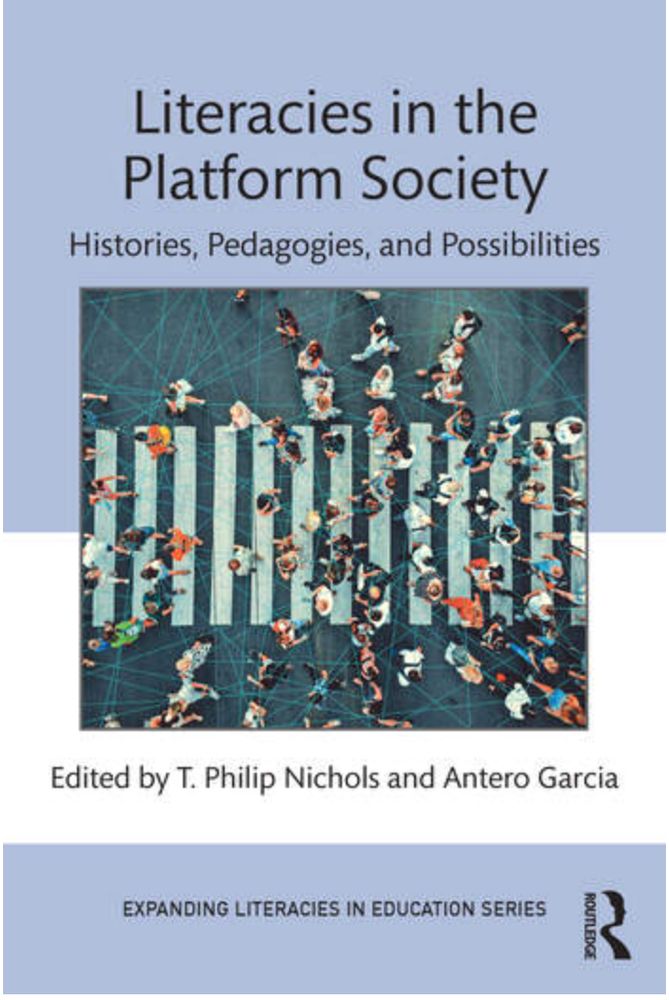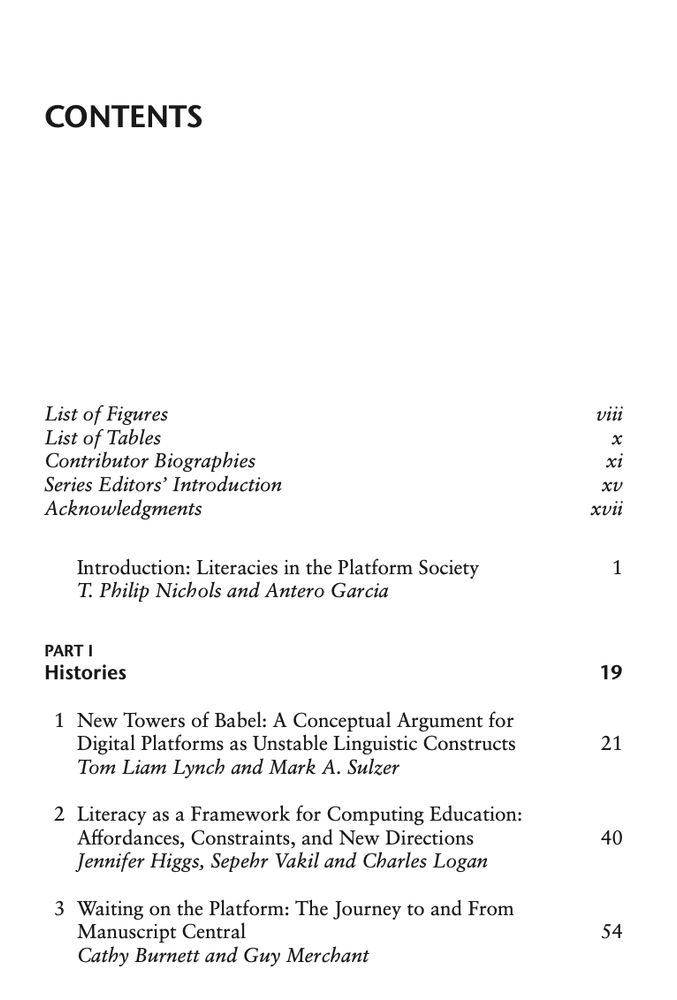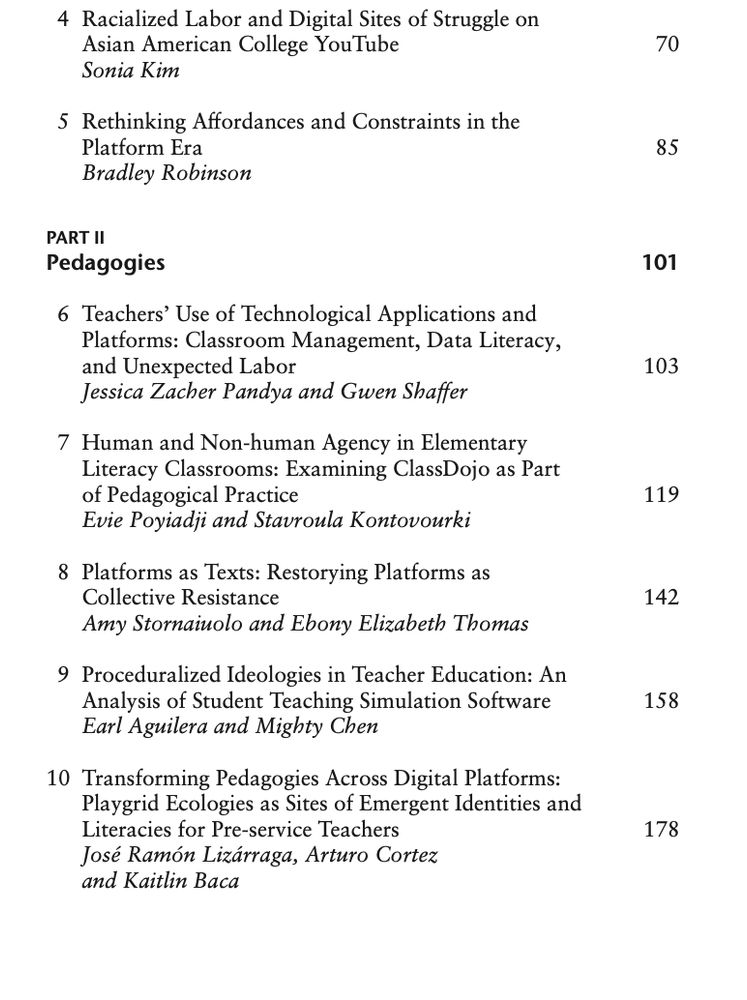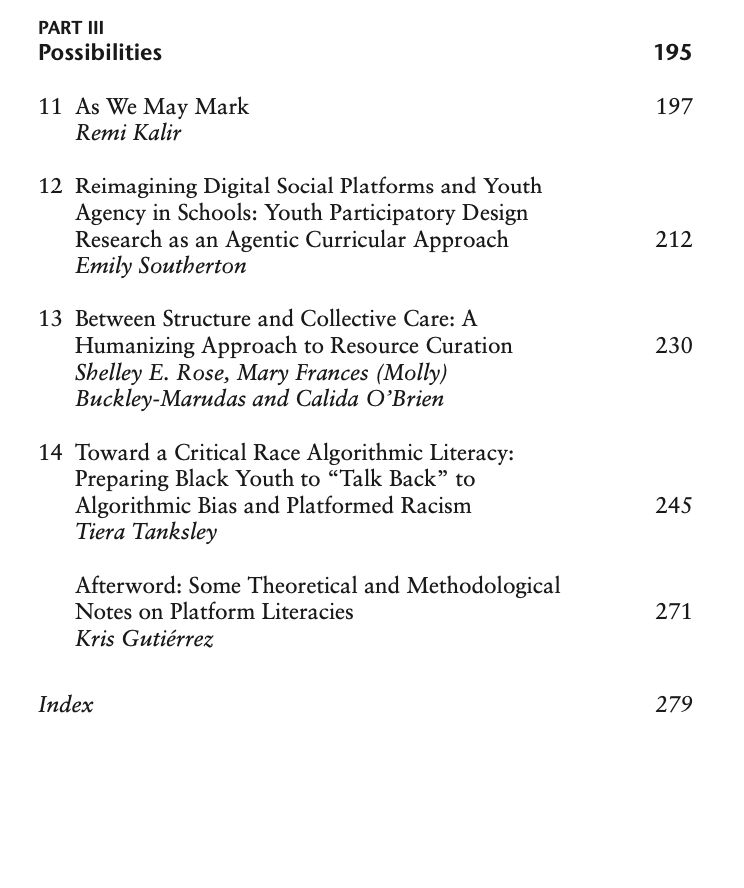❤️ 📚 🌈
30.09.2025 11:13 — 👍 3 🔁 0 💬 0 📌 0
Everyday #annotation as resistance to techno-dystopian futures!
29.09.2025 22:35 — 👍 2 🔁 0 💬 0 📌 0
Talk about public re/marks of resistance! @remikalir.bsky.social
29.09.2025 22:11 — 👍 9 🔁 1 💬 1 📌 0
Awesome! #annotation
18.09.2025 15:57 — 👍 3 🔁 0 💬 0 📌 0
“Inviting commentary turns a static course document into a living conversation. Students ask clarifying questions, highlight confusions, and voice what matters to them—all while signaling that learning will sometimes be a co-constructed endeavor.”
#AnnotatedSyllabus
27.08.2025 14:20 — 👍 4 🔁 0 💬 0 📌 0

Re/Marks on Power
Annotation—the seemingly simple act of marking a text—is often diminished as a marginal practice. It is prohibited in physical objects and considered irr...
Hey yall, lots of new followers (huh? ok!), a few links if you’d like to connect.
I recently wrote a book about annotation and power, it’s open-access, read it here:
mitpress.mit.edu/978026255103...
Subscribe to my newsletter:
www.readingremarks.com
And learn more about my work at: remikalir.com
24.08.2025 21:46 — 👍 11 🔁 3 💬 0 📌 0
I love this type of public practice so much, because it’s so simple, so routine, and so visually effective—not to mention necessary and true!
30.07.2025 21:25 — 👍 2 🔁 0 💬 0 📌 0
#annotation
30.07.2025 21:12 — 👍 3 🔁 0 💬 0 📌 0
I'm here for annotation as counter-storytelling - and an annotation activity like this is something teachers and students can do together to analyze the rhetorical moves in Big Tech press releases about AI in education too.
30.07.2025 19:25 — 👍 67 🔁 18 💬 1 📌 2

Re/Marks on "Restoring Truth"
Anticipating censorship, what will become of the annotated Path to Preservation timeline at Muir Woods National Monument?
😡 Called it, sadly. As reported yesterday in the NYTimes, an annotated sign at Muir Woods National Monument has been censored and removed.
Annotation isn't neutral. Nor are responses to notes of power.
The annotated sign may be gone, but history won't change.
www.readingremarks.com/remarks-on-r...
23.07.2025 20:30 — 👍 1 🔁 1 💬 0 📌 0

Re/Marks on "Restoring Truth"
Anticipating censorship, what will become of the annotated Path to Preservation timeline at Muir Woods National Monument?
😡 Called it, sadly. As reported yesterday in the NYTimes, an annotated sign at Muir Woods National Monument has been censored and removed.
Annotation isn't neutral. Nor are responses to notes of power.
The annotated sign may be gone, but history won't change.
www.readingremarks.com/remarks-on-r...
23.07.2025 20:30 — 👍 1 🔁 1 💬 0 📌 0
"#Annotation enables the production of new forms of public dialogue and paratext in response to other people..., texts..., and ideas...that are of social and political consequence." - @remikalir.bsky.social and @anterobot.bsky.social.
04.07.2025 15:16 — 👍 4 🔁 3 💬 0 📌 0
Authors in Part 3 include: @remikalir.bsky.social, Emily Southerton, Shelley E. Rose, Molly Buckley-Marudas, Calida O'Brien, @drtanksley.bsky.social.
27.06.2025 19:29 — 👍 3 🔁 1 💬 1 📌 0
The book explores how digital platforms are remaking the study, teaching, and practice of literacy—and the implications for educational equity.
What does it mean when the same platforms that enable powerful forms of networked reading/writing also enroll those literacies in extractive data regimes?
27.06.2025 19:29 — 👍 5 🔁 1 💬 1 📌 0

Cover of the book, Literacies in the Platform Society: Histories, Pedagogies, and Possibilities, edited by T. Philip Nichols and Antero Garcia, and published in the 'Expanding Literacies in Education' series at Routledge.

Text from the Table of the Contents.
List of Figures, List of Tables, Contributor Biographies, Series Editors’ Introduction, Acknowledgments.
Introduction: Literacies in the Platform Society by T. Philip Nichols and Antero Garcia
PART I — Histories
New Towers of Babel: A Conceptual Argument for
Digital Platforms as Unstable Linguistic Constructs by Tom Liam Lynch and Mark A. Sulzer
Literacy as a Framework for Computing Education: Affordances, Constraints, and New Directions by Jennifer Higgs, Sepehr Vakil and Charles Logan
Waiting on the Platform: The Journey to and From
Manuscript Central by Cathy Burnett and Guy Merchant

Table of contents, continued.
Racialized Labor and Digital Sites of Struggle on Asian American College YouTube by Sonia Kim
Rethinking Affordances and Constraints in the Platform Era by Bradley Robinson
PART II - Pedagogies
Teachers’ Use of Technological Applications and Platforms: Classroom Management, Data Literacy,and Unexpected Labor by Jessica Zacher Pandya and Gwen Shaffer
Human and Non-human Agency in Elementary Literacy Classrooms: Examining ClassDojo as Part of Pedagogical Practice by Evie Poyiadji and Stavroula Kontovourki
Platforms as Texts: Restorying Platforms as Collective Resistance by Amy Stornaiuolo and Ebony Elizabeth Thomas
Proceduralized Ideologies in Teacher Education: An Analysis of Student Teaching Simulation Software by Earl Aguilera and Mighty Chen
Transforming Pedagogies Across Digital Platforms: Playgrid Ecologies as Sites of Emergent Identities and Literacies for Pre-service Teachers by José Ramón Lizárraga, Arturo Cortez, and Kaitlin Baca

Table of contents, continued.
Part 3 - Possibilities
As We May Mark by Remi Kalir
Reimagining Digital Social Platforms and Youth Agency in Schools: Youth Participatory Design Research as an Agentic Curricular Approach by Emily Southerton
Between Structure and Collective Care: A Humanizing Approach to Resource Curation by Shelley E. Rose, Mary Frances (Molly)
Buckley-Marudas and Calida O’Brien
Toward a Critical Race Algorithmic Literacy: Preparing Black Youth to “Talk Back” to Algorithmic Bias and Platformed Racism by Tiera Tanksley
Afterword: Some Theoretical and Methodological Notes on Platform Literacies by Kris Gutiérrez
Index
Literacies in the Platform Society: Histories, Pedagogies, and Possibilities—edited by me and @anterobot.bsky.social—is out today! 🎉
It's been an absolute privilege to work with so many brilliant people, over multiple years, to make this book a reality.
www.routledge.com/Literacies-i...
27.06.2025 19:29 — 👍 25 🔁 14 💬 3 📌 1
Always nice to see these kinds of articles when they pop up
24.06.2025 14:13 — 👍 1 🔁 0 💬 0 📌 0
Great commentary that echoes my post from earlier this week on the NPS, censorship, history, and the current administration’s so-called “restoring truth” efforts.
What will become of the annotated Path to Preservation timeline at Muir Woods National Monument? www.readingremarks.com/remarks-on-r...
20.06.2025 13:43 — 👍 0 🔁 1 💬 0 📌 0
“Did your dad die?” our six-year old son asked me this morning.
“No,” I replied, “But I don’t talk to him. He didn’t raise me. Who raised me?”
“Grandma Wendy.”
Father’s Day is becoming a bit more nuanced in our family and I don’t take it for granted that Ade and I can make sense of this together.
15.06.2025 14:55 — 👍 18 🔁 0 💬 0 📌 0
#annotation
14.06.2025 00:53 — 👍 25 🔁 5 💬 0 📌 0
so sorry, Kevin, ❤️
12.06.2025 02:07 — 👍 0 🔁 0 💬 0 📌 0

A “Students Don’t Read” Rant
Yes, some discrete “students don’t read” observations are true. And, this discourse is easily weaponized with harmful implications.Perpetuating “students don’t read” amplifies deficit narratives ab…
New on my blog: A “Students Don’t Read” Rant
A student struggling to comprehend a text, struggling to read, is also a learner with many literacies.
A student resistant to reading, refusing a book, is also a learner with many literacies.
remikalir.com/blog/a-stude...
23.05.2025 15:26 — 👍 3 🔁 2 💬 0 📌 0

A “Students Don’t Read” Rant
Yes, some discrete “students don’t read” observations are true. And, this discourse is easily weaponized with harmful implications.Perpetuating “students don’t read” amplifies deficit narratives ab…
A student who may not want to read what’s assigned in school, who may not display conventional behaviors of academic performance, is also a learner who will share their many literacies with trusted friends and mentors.
Full post:
remikalir.com/blog/a-stude...
22.05.2025 21:24 — 👍 5 🔁 1 💬 0 📌 0
You're very welcome, Kevin!
22.05.2025 21:26 — 👍 0 🔁 0 💬 0 📌 0

A “Students Don’t Read” Rant
Yes, some discrete “students don’t read” observations are true. And, this discourse is easily weaponized with harmful implications.Perpetuating “students don’t read” amplifies deficit narratives ab…
A student who may not want to read what’s assigned in school, who may not display conventional behaviors of academic performance, is also a learner who will share their many literacies with trusted friends and mentors.
Full post:
remikalir.com/blog/a-stude...
22.05.2025 21:24 — 👍 5 🔁 1 💬 0 📌 0
A student struggling to comprehend a text, struggling to read, is also a learner with many literacies.
A student resistant to reading, refusing a book, is also a learner with many literacies.
22.05.2025 21:24 — 👍 2 🔁 0 💬 1 📌 0
Literacies are mediated by different languages, customs, and technologies. As language practices, and cultural norms, and digital technologies change, so too do our learners’ multimodal literacies.
Please, please, please let’s remember that:
22.05.2025 21:23 — 👍 1 🔁 0 💬 1 📌 0
“Having fun isn’t hard, when you’ve got a library card!” - Arthur Read
•Library’s Number One Fan
•Mental Health Matters ALWAYS
Washington correspondent and founding partner @ Puck. All views my own, not of my employer. Tomorrow will be worse. For more inspirational insights, subscribe at https://puck.news/author/julia-ioffe/
literature prof, book historian, cultural sociologist, anti-work communist gadfly
https://carleton.ca/english/people/brouillette-sarah/
American Vandal Pod | Prof of AmLit & Twain Studies + Director of Media Studies, Elmira College | Resident Scholar @MarkTwain.bsky.social | Political Economy of Mass Media
TheAmericanVandal.substack.com
MattSeybold.com
buymeacoffee.com/americanvandalpod
Assemblymember. Democratic Nominee for Mayor of NYC. Running to freeze the rent, make buses fast + free, and deliver universal childcare. Democratic Socialist. zohranfornyc.com
I cover infectious diseases for STAT (www.statnews.com). 2020 Polk winner. Nieman '11. She/her. I write about H5N1 (in all species), Covid, polio, flu, Ebola, RSV, mpox, STIs. Find me on Signal: HBranswell.01
Penn professor & faculty director of the Price Lab for Digital Humanities. Author, CUT/COPY/PASTE (2021). Weird old books & technologies, thinking about data, craftwork, feminist media histories. Creative/critical. Libraries are dope. Still a punk.
A literary meetingplace since 1953, City Lights is a landmark bookstore and publishing house, known for our commitment to innovative writing and progressive ideals.
Econ professor at Michigan ● Senior fellow, Brookings and PIIE ● Intro econ textbook author ● Think Like An Economist podcast ● An economist willing to admit that the glass really is half full.
The American Association of University Professors champions academic freedom, advances shared governance, and organizes faculty to ensure higher education's contribution to the common good.
aaup.org
Dad, husband, host @Marketplace. IPAs. Soccer referee, trail runner, mountain biker. Veteran. kryssdal@marketplace.org
Writing on books, movies, the arts: NYT Magazine, Baffler, Washington Post, Atlantic, Liberties, Commonweal, Mubi, Paris Review, Nation, etc. robjrub@gmail.com
Overcaffeinated Kentuckian in Massachusetts. Librarian. Professor. Trustee. Ask me about #GraphicMedicine. Trying to be kind, do good, and read comics. (He/Him)
linktr.ee/NoetheMatt
The Journal of Interactive Technology and Pedagogy: promoting open scholarly discourse around uses of digital technology in teaching, learning, and research.
https://cuny.manifoldapp.org/journals/jitp
A collaborative project to discuss learning & teaching in HE with the wider community via tweetchats, first #lthechat 29.10.14, Wed 8-9pm UK time, join us!
We Need Diverse Books is a 501(c)(3) nonprofit revolutionizing what we read to create a world where everyone can find themself in the pages of a book.
🔗 bio.site/WeNeedDiverseBooks
Archives, DH, Museums, African American studies, C19 and early C20. I am, ashamedly, a curator now too
all opinions my own, not my employer's
www.dorothy-berry.com
Dad, husband, President, citizen. barackobama.com
Historian, Co-Founder & Principal Consultant at The Source Historical Consulting. Author of Elreta Melton Alexander biography (UGA Press). Teaches at Salem College. #WSNC
#WNC born and raised.
www.virginialsummey.com
www.thesourcehistory.com
Librarian. Historian. Gulf Coaster.
Head of Research & Instruction at Monroe Library, Loyola University New Orleans.









